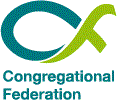Congregationalism
A way of being Church "united with Christ and one another"
The Congregational way of being church can be traced back to early church teaching, for example in this passage from Acts:-
Acts 2 v 42 "They devoted themselves to the apostles teaching and to fellowship, to the breaking of bread and to prayer"
Congregationalism is a small Christian protestant denomination in Great Britain comprising just under 300 congregations.
Congregationalism is a way of being church today without any hierarchical structures. Each Congregational church is independent and decisions on the type of worship and other activities and the maintenance of the property are taken by regular church meetings to which all church members are invited to take part.
Congregational churches in England date back to 1662 when the non-conformists wanted independence and freedom from the established church in order to become more directly dependant on the will of God.
"For where two or three gather in my name, there I am with them" Matthew 18 v20
A Congregational Church is one that believes in the Trinity, Communion is open to all, Baptism is open to both adults and children. Congregationalists share and respect each other and serve and decide things together as guided by the Holy Spirit at the church meeting.
Three Congregational Principles
-
A church where Christ is the head, with no external hierarchy
-
A church based on a covenant relationship with God and with one another, where seeking the mind of Christ is the basis of all that is done.
-
A church where all the members are considered equal before God, and all skills and giftings are valued and recognised.

